This October, Duke Divinity School celebrated the 15th anniversary, the quinceañera, of the founding of the Hispanic House of Studies with a series of events on Oct. 12, including a panel discussion, worship, lecture, and a documentary and art exhibit featuring renowned artist Enrique Chiu.
From Roots in the North Carolina UMC to an International Scope
The Hispanic House of Studies, La Casa, was founded with the support of the North Carolina and Western North Carolina Conferences of the United Methodist Church (UMC) and The Duke Endowment as a resource center for students, pastors, and congregations to support their efforts to do ministry with Hispanic/Latinx communities in North Carolina.
In its early years, La Casa’s programs focused largely on the UMC. It led the student Caminantes group at the school; launched Pastores Caminantes, a group of working pastors who met monthly, promoting conversation and scholarship and collaborating with other UMC-focused groups such as Thriving Rural Communities; organized Sumérgete retreats for UMC pastors and lay leaders in Hispanic/Latinx communities; partnered with local congregations and the Duke Youth Academy to develop young leaders in their call to ministry; supported the Hispanic ministries of the North Carolina and Western North Carolina Conferences; co-sponsored the Hispanic Summer Program (HSP), a program that trains Latinx theological and academic leaders in seminaries around the country; co-sponsored the Hispanic Theological Initiative (HTI), a consortium to expand the recruitment, retention, and graduation rates of Latinx doctoral students; partnered with Methodist leaders in Central America to offer the Methodist Course of Study in Central America; and launched the Duke-Peru Theological Initiative, a partnership between the Methodist Church of Peru and Duke Divinity School.

Sumérgete 2019 participants pose for a group photo.
“In many ways, the Hispanic House has served as a gateway to the UMC,“ said Alma Tinoco Ruiz, the director of the Hispanic House and assistant professor of the practice of homiletics and evangelism. “We have students who are still discerning their place come to Caminantes and find a calling that led to ordination.”
Today, while the connections to the UMC remain strong, the mission of La Casa has expanded even further to support Hispanic/Latinx students and ministers from a range of religious traditions, and it also includes more programs that reach outside North Carolina and beyond the borders of the U.S. into Latin America.
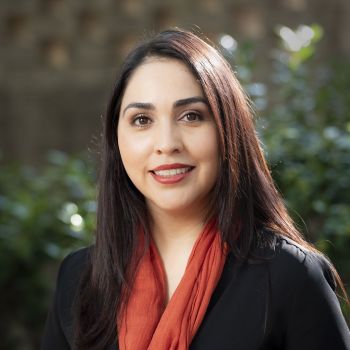
“For the past 15 years, La Casa has been a place of refuge for many students, Latinx and not. In La Casa, many have found their calling and lifelong partners in ministry and life. In addition, La Casa has over time built a remarkable community of partners, including churches and other institutions, that has allowed us to expand our reach well beyond the university.”
While La Casa continues to organize Sumérgete retreats and conversations for pastors and lay leaders, leads the student Caminantes group, co-sponsors HSP and HTI, partners on the Methodist Course of Study, and supports UMC Hispanic ministries in the North Carolina conferences, it now also leads the Hispanic Latino Pastoral Initiative (HLPI), a three-year Spanish-language ministerial certificate program that trains Latinx pastors, lay leaders, and congregants in the U.S. and throughout Latin America. The staff for Hispanic House has expanded to three full-time and one part-time position, including staff who work on other grant-funded programs.
“This all makes the program richer for Methodist students,” says Tinoco Ruiz. “Because it’s not only a program for Methodist students, the conversation is rich and helps our students learn from other Christian traditions.”
“It’s an irrigation hose of leaders,” says the Rev. Ismael Ruiz-Millán, who was the director of La Casa between 2011 and 2020 and is now the heritage district superintendent in the UMC’s North Carolina Conference. “Lay leaders are encouraged through their churches and start to go to HLPI. Now you have lay people who are formed through HLPI and have gone on to seminary, including Duke, and become pastors. Our Caminantes students graduate and work for organizations in the church and beyond. It has become a seed that is planted here and then spreads.”
And in 2021, Duke Divinity School launched a Certificate in Latinx Studies, which can be earned as part of the M.Div., M.T.S., and M.A. in Christian Practice degrees, and is designed to prepare students for ministry in Hispanic/Latinx churches and communities in the U.S. A full-tuition Latinx Studies Certificate Fellowship currently supports 15 students and includes additional mentoring opportunities as well as stipends for field education.
From the beginning, La Casa served as a place to build connection. “For the past 15 years, La Casa has been a place of refuge for many students, Latinx and not,” said Tinoco Ruiz. “In La Casa, many have found their calling and lifelong partners in ministry and life. In addition, La Casa has over time built a remarkable community of partners, including churches and other institutions, that has allowed us to expand our reach well beyond the university.”

Alma Tinoco Ruiz greets the community during the Quinceañera worship service.

Dean Edgardo Colón-Emeric gives a blessing during morning worship.

Katherine Guerrero speaks during a lunchtime panel discussion.
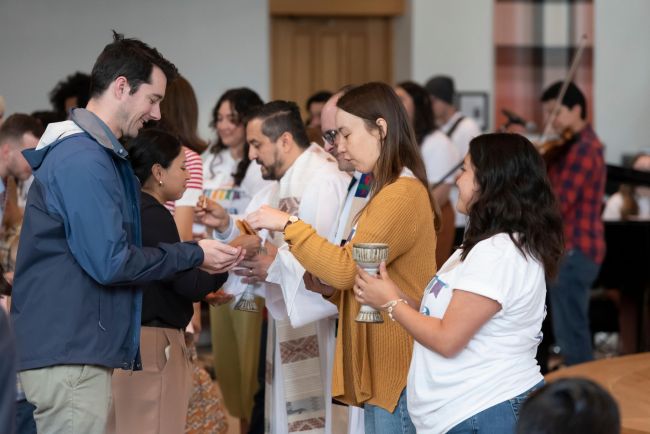
Communion was served during the worship service.
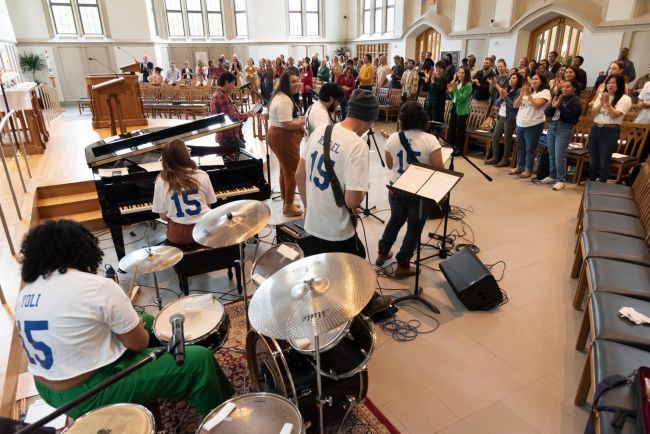
The service featured music led by Hispanic House musicians.
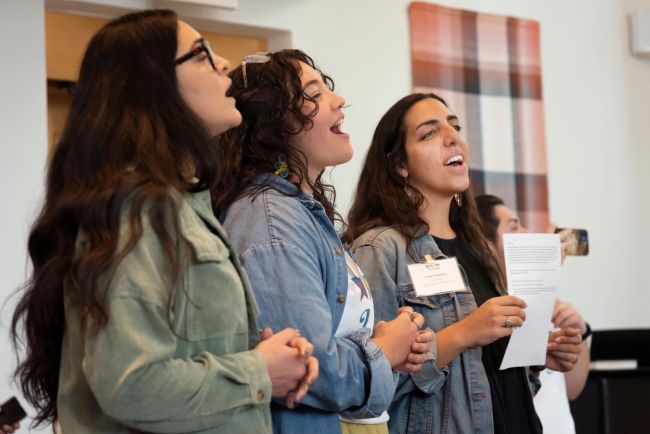
Hispanic House students and alumni sing during worship.
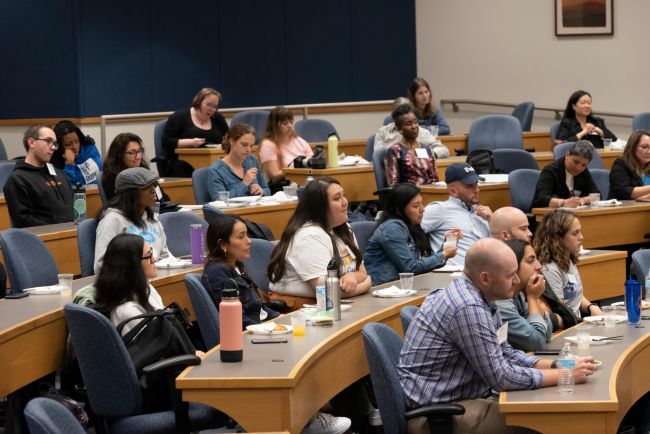
Attendees listen to students and alumni speak about the importance of La Casa to their lives and theological formation.

Students, faculty, staff, alumni, and friends attended worship.
Expanding the Theological Imagination of Duke Divinity School
The growth of La Casa was helped by the emphasis on having a faculty director for most of its history, and on always having a director with strong connections to the church and to Latinx-focused organizations. Duke Divinity School Dean Edgardo Colón-Emeric, the founding director of the house, and Ruiz-Millán are the first Latino pastors to be ordained in the North Carolina Conference of the UMC. Tinoco Ruiz is an ordained elder in the UMC with deep connections to UMC Latinx ministry and as the current faculty director, brings weight and autonomy to La Casa, with roles as the principal investigator in projects such as the Transformative Preaching Lab, which seeks to prepare creative, culturally competent preachers who can reach audiences in effective and engaging ways.
In addition, the Latinx faculty presence at Duke Divinity has expanded significantly since La Casa’s founding, developing into a true network of scholars with Latinx roots and scholarship. At the same time, the student Hispanic/Latinx community has grown to encompass students from a wide variety of faith traditions. Students now report coming to Duke specifically because of Hispanic House, a resource that doesn’t exist in most other seminaries.
“From our earliest visions of the Hispanic House, it has grown to become a familia at Duke Divinity and a fountain for the church and the academy,” said Colón-Emeric.

This growth has helped ensure a flourishing of theological thought and vision that informs the work of the entire school.
Teaching Borderlands @ Duke, a project launched in 2022 in collaboration with the Hispanic Summer Program and Duke Divinity Latinx faculty, teaches faculty and staff at Duke Divinity how to approach their theological views and the teaching of issues around the U.S. border ethically, courageously, and critically through workshops, an immersive experience in the local Hispanic/Latinx community, and an immersion to the U.S./Mexico border.
Initiatives and approaches that started at La Casa, including an intercultural development inventory to develop intercultural competence that emphasizes taking an approach of cultural humility when working in and with different cultures, have spread to other areas of the school, including student coursework, Thriving Rural Communities, and the UMC Course of Study program. In addition, the Hispanic House has partnered with other groups like the Center for Reconciliation and DurhamCares on local community pilgrimages and other events, part of its tradition of engagement with other Duke Divinity groups and local organizations.
“Even if students aren’t directly engaged in ministry within the Hispanic/Latinx community, they will be exposed to these communities,” says Tinoco Ruiz. “Census research shows us that by 2045, racial and ethnic minority groups will be the majority. And so I believe equipping students to do ministry in diverse communities is very important; It’s not optional anymore for pastors.”
Said Ruiz-Millán, “Having the Hispanic House has really changed the school’s approach to theological education and opened a window for the school to be exposed to different voices and spaces. The legacy of the Hispanic House is that it has helped Duke Divinity School expand its horizons of theological education and the practice of ministry.”
“We believe that God’s plan is for all people,” he says. “Having a Hispanic House and other houses of study—and ensuring they have the resources that they need—shows commitment to that vision. It says we’re committed to that vision of serving all people and forming leaders who pay attention to that diversity in God’s creation.”
“Having the Hispanic House has really changed the school’s approach to theological education and opened a window for the school to be exposed to different voices and spaces. The legacy of the Hispanic House is that it has helped Duke Divinity School expand its horizons of theological education and the practice of ministry.”
A Look Back and a View Forward
The school’s Quinceañera celebration on Oct. 12, along with a banquet the night before, reflected on the house’s history and the continued importance of Latinx-focused ministry and academic work.
During the morning worship service, Dean Colón-Emeric preached about the celebration of the La Casa, saying that the purpose of the Hispanic House can be summed up in one word: fiesta. He compared the great, final fiesta to a choral concert sung in harmony, as opposed to a chorus in which each section practices their part separately, without listening to the whole.
“What is a Latinx Studies certificate really for? What is the purpose of Caminantes? Why HLPI? To announce fiesta and anticipate the final fiesta,” he said. “This means coaching voices that have been historically or demographically dominant to sing more softly; it means preparing voices that have been sidelined to come out more strongly; it means forming people who listen, learn, and love Hispanic voices so that all Christians can be more in tune with the gospel. For this purpose, God has been building La Casa at Duke Divinity to announce fiesta, to anticipate the day of the great fiesta, and to adore the Lord of the Fiesta.”
At a lunchtime panel discussion, Hispanic House students and alumni spoke about the importance of La Casa to their lives and theological formation, calling it a contemplative space, a space to find and strengthen their own voices, to share encouragement and support, and a space of deep vulnerability.
“I found an anchor, a reminder of who I am, where I came from, and where I’m going – a place where I can take risks, spiritually and intellectually,” said Andrés Pérez González, a current Latinx Fellow and student pastor at the Divinity School and the founder of a bilingual Latino/a faith community called Brazos Abiertos UMC in Greensboro, N.C.
Katherine Guerrero, M.Div. ’18, a third-year Ph.D. student in religious studies at Yale University, shared her experiences as a refugee who came to U.S. when she was a teenager and returned to the border during a Hispanic House immersion experience. That experience has informed her doctoral research, she said, emphasizing the need for spaces and ministries with trauma-informed leaders who can help people process their pain and trauma.
Student and Alumni Panel

Andrés Pérez González, M.Div. ‘26, Student Pastor and Latinx Fellow
Andrés Pérez González was born and raised in northeast Mexico in the city of Monterrey, where he lived most of his life. Before moving to North Carolina, he lived in Vancouver, Canada, where he attended graduate school and served as a worship and discipleship pastor. He is currently a Latinx fellow and student pastor at Duke Divinity School and the founder of a bilingual Latino/a faith community called Brazos Abiertos UMC based in Greensboro, N.C.
Victoria Pérez Rivera, M.T.S. ‘17
Victoria Pérez Rivera is a Ph.D. candidate at the University of Southern California and an adjunct Bible professor at Latin American Bible Institute College. She earned her Master of Theological Studies at Duke Divinity School. Her research focuses on the reception history of Pauline literature and its repercussions in the present. She is passionate about the Latinx community, social justice, and theological education.
Katherine Guerrero, M.Div. ‘18
Katherine Guerrero is a third-year Ph.D. student in religious studies at Yale University. A 2022 Fellow with the Louisville Institute and 2021 Graduate Fellow with Yale’s Center for Race Indigeneity and Transnational Migration, Guerrero’s research recounts her journey through the U.S.-Mexican border as a teenager in order to theorize the violence encountered and examine the theological implications of border crossing experiences. Katherine has also worked closely with Latinx congregations, local pastors and community organizations in Texas and North Carolina.
Trinity Long, M.Div. ‘25 and Latinx Fellow
Trinity Long is from southern California and graduated from Baylor University with a B.A. in psychology. She is a second year M.Div. student and a Latinx Fellow pursing the Certificate in Latinx Studies and a Certificate in Baptist Studies. She is serving as treasurer for the student group La Unión Latina and mentorship coordinator for the Hispanic House. She is also a Baptist Women in Ministry North Carolina Scholar and is one of the Cooperative Baptist Fellowship’s leaders in seminary.
Jaden DeJesus, M.T.S. ‘25 and Latinx Fellow
Jaden DeJesus is a theological artist, writer, and community educator currently earning his Master in Theological Studies at Duke Divinity School. He earned his bachelor’s degree in Fine Art from the University of Texas at San Antonio in 2023. His work concerns the theological ramifications of space and the process of visual theological inquiry.
In the evening, a documentary, “Un Mundo Sin Muros,” and exhibit, “Humanidad Migrante,” featured the work of Enrique Chiu, creator of El Mural de la Hermandad, a collaborative project involving thousands of volunteers who worked with him to paint a mile-long mural on the border wall between the U.S. and Mexico. During a lecture with Chiu and a panel discussion with North Carolina-based artists Tirzah Villegas and Renzo Ortega, the speakers addressed migration and liberation theology from the perspective of the arts and movements for social justice.

Chiu spoke about traveling to Tijuana and the impact of seeing nearly 100 people being deported from the U.S., which inspired him to begin El Mural de la Hermandad, an ongoing project that has expanded to border wall projects around the world.
During the panel discussion, Ortega addressed the impacts of colonialism, including the term “Hispanic,” a legacy of colonists forcing indigenous peoples to speak Spanish, and biases that assume Latin artists are limited to being only community mural painters.
Said Dean Edgardo Colón-Emeric, “This Quinceañera was a celebration of God’s mighty acts through and from Hispanic/Latino people and a sign that a new Pentecost is not only pressing, possible and promised, it is present.”
Featured Quinceañera Speakers & Worship Leaders

Colón-Emeric is dean of Duke Divinity School, Irene and William McCutchen Professor of Reconciliation and Theology, and director of the Center for Reconciliation. He was the founding director of the Hispanic House of Studies. Colón-Emeric’s work explores the intersection of Methodist and Catholic theologies, and Wesleyan and Latin American experiences. Born and raised in Puerto Rico, Colón-Emeric was the first Latino to be ordained as an elder in the North Carolina Conference of the United Methodist Church and was founding pastor of Cristo Vive UMC in Durham, N.C. He serves on the United Methodist Committee on Faith and Order and on both national and international Methodist-Catholic dialogues.

Tinoco Ruiz, the current director of the Hispanic House, is a practical theologian whose work centers on the intersection of homiletics, pastoral care, and evangelism. Tinoco Ruiz was awarded the Denman Fellow of the Foundation for Evangelism (FFE) in 2016, the Forum for Theological Exploration (FTE) Doctoral Fellowship in 2019, and the Hispanic Theological Initiative (HTI)/Lilly fellowship in 2020. She is an ordained elder in the United Methodist Church
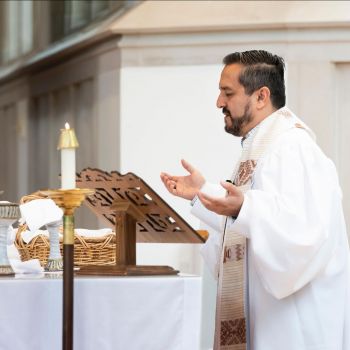
Rev. Ismael Ruiz-Millán is originally from San Luis Rio Colorado, Sonora, Mexico. He is an ordained elder in the North Carolina Conference of the United Methodist Church and currently serves as the heritage district superintendent in the North Carolina Conference of the United Methodist Church. He served as director of the Hispanic House of Studies, global education, and intercultural formation at Duke Divinity School from 2011 to 2020.
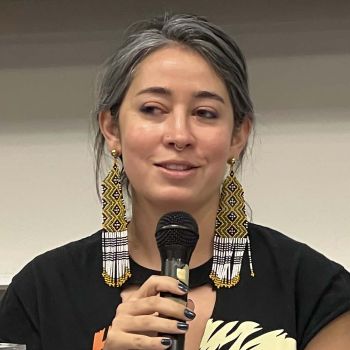
Tirzah Villegas is a queer Durham-based Nepantla artist from both North Carolina and Colorado who works predominantly in oil paints. She has a background in art from UNC Asheville and a Master of Divinity from Duke Divinity. Over the years, Villegas’s art has evolved with some common threads. Her interaction with and interpretation of the divine is represented through her artwork through exploration of the natural world, both visible and unseen. In addition to painting, Villegas works through her business, Seven Directions Art, to provide workshops and other opportunities for the community that explore ideas around art, death, sacred spaces, and community.
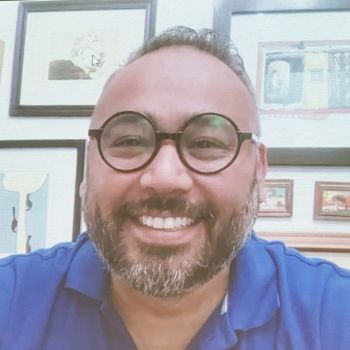
Enrique Chiu is a doctor honoris causa, activist, and plastic artist. He holds a bachelor’s degree in marketing from California State University Long Beach and a degree in design and audiovisual Arts from CCSA Santa Ana. His pictorial work has been exhibited in galleries in Mexico, the U.S., Europe, the Middle East, and South America. He is the creator of El Mural de la Hermandad, a collaborative project involving thousands of volunteers who worked with him to paint a mile-long mural on the border wall between the U.S. and Mexico. His work is permanently exhibited in museums in the United States, Spain, Germany, Guatemala, and Mexico. Chiu joined the events via Zoom.
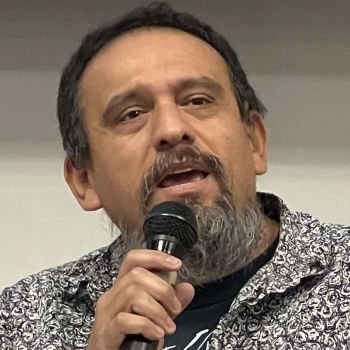
Renzo Ortega, born in Lima, Peru, is a painter based in Carrboro, N.C. Ortega earned a BFA in painting from the Escuela Nacional de Bellas Artes del Peru, studied at the Art Students League of New York (2000-2004), and earned an MFA in painting from Hunter College. His artwork has been exhibited in solo and group shows in the U.S. and Peru, and he been commissioned to create public art projects and community murals. He is a recipient of the North Carolina Arts Council Artist Fellowship Award, the Ella Fountain Pratt Emerging Artists Grant Durham Arts Council, the Orange County Arts Commission Artist Project Grant, and the Queens Council on the Arts New Work Award. Ortega is also a devoted painting and drawing teacher and has been a visiting lecturer at UNC–Chapel Hill and a Brock Family Visiting Studio Arts Instructor at Duke University.
The Hispanic House of Studies was founded with the generous support of The Duke Endowment and works in partnership with the North Carolina and Western North Carolina Conferences of the United Methodist Church. Additional funding for programs has been provided by the Lilly Endowment Inc. The Sumérgete retreats are funded by the Parish Ministry Fund and the North Carolina and Western North Carolina conferences. The Foundation for Evangelism provides funding for the assistant professor of the practice of homiletics and evangelism and director of the Hispanic House of Studies.